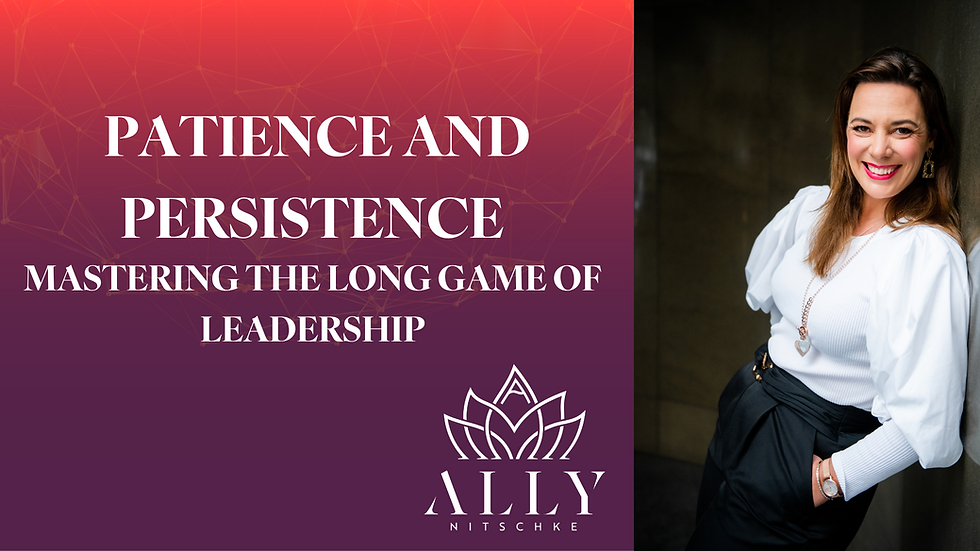The Success Mindset: Shifting from Limiting Beliefs to Limitless Potential
- payton102
- 1 day ago
- 3 min read
Updated: 10 minutes ago
Leadership success doesn’t just hinge on strategy, skills, or even experience. At its core, it’s shaped by mindset. the way leaders perceive challenges, embrace opportunities, and interpret setbacks. Limiting beliefs act as invisible barriers, stifling innovation, curbing ambition, and undermining performance.
By identifying and shifting these patterns, leaders can unlock a boundless capacity for growth and transform their organisations. This piece explores the profound impact of mindset on leadership outcomes, while offering actionable strategies for moving beyond limitations and realising unlimited potential.
The Influence of Mindset on Leadership Success
Why It Matters:
Leaders often hold deep-seated assumptions about their own abilities, their teams, and their organisational constraints. These mental narratives shape their decisions, communication style, and even their long term-vision. While a success orientated mindset encourages resilience, creativity and collaboration, a limiting mindset perpetuates fear, hesitation and missed opportunities.
Recognising Limiting BeliefsCommon Examples in Leadership:
“I’m not ready yet”
“This strategy worked before, so it’s the only way forward”
“If I ask for help, I’ll look weak”
“I must have all the answers to be respected”
Why These Beliefs Persist:
Limiting beliefs often stem from past experiences, organisational culture, or societal expectations. Leaders who were previously criticized for mistakes may become risk-averse, while those surrounded by traditional corporate norms may feel bound to outdated approaches.
The Cost of Limiting Beliefs
Why It Matters:
When leaders operate from a place of limitation, they inadvertently set boundaries for their teams and organisations. Fear of failure stifles innovation. A rigid adherence to the past discourages adaptability. Ultimately, these beliefs become self-fulfilling prophecies, causing talented employees to disengage, creative ideas to go unspoken, and growth opportunities to slip away.
Shifting to a Success-Oriented Mindset
Step 1: Awareness
Identify Negative Thought Patterns: Start by noticing recurring negative self-talk or assumptions.
Reflect on Outcomes: Consider how these beliefs have influenced past decisions and their results.
Recognise the Triggers: Understand when and why these thoughts arise—perhaps during high-stakes meetings, after a setback, or when exploring new initiatives.
Step 2: Reframe and Rewire
Challenge Assumptions: Question the validity of your limiting beliefs. For example, if you think “I can’t delegate this project without losing control,” ask yourself what evidence supports that. Then consider what might happen if the project is successfully delegated.
Replace With Empowering Beliefs: Swap “I’m not good enough” with “I’m capable and continuously improving.” Shift “This has never been done” to “This is an opportunity to innovate.”
Celebrate Progress: Acknowledge small victories that come from embracing a more open mindset. Over time, these positive reinforcements solidify new neural pathways, making success-oriented thinking your default approach.
Fostering a Growth-Oriented Environment
Why It Matters:
Leaders set the tone for their teams. By adopting a limitless mindset, they not only enhance their own performance but also inspire those around them. Teams become more resilient, open to change, and willing to experiment—qualities essential for thriving in today’s fast-paced, competitive environment.
Practical Takeaways:
Model Vulnerability and Curiosity: Share instances where you overcame a limiting belief, showing your team that growth is a continuous process.
Encourage Open Dialogue: Create a culture where employees feel safe to share ideas, even if they seem unconventional.
Reward Innovative Thinking: Recognise and reward team members who challenge assumptions, think creatively, and drive new initiatives.
Leadership outcomes are deeply influenced by mindset. By recognising limiting beliefs, reframing them, and fostering an environment of growth, senior leaders can unlock their full potential. This shift not only enhances individual performance but also creates a ripple effect that transforms teams, fuels innovation, and drives organisational success.
Ally
Ally Nitschke is a best-selling Author, an award-winning Thought Leader and Speaker. She has been working with leaders and as a Leader for over 20 years.
She is on a mission to change the way we communicate at work, to lean into those uncomfortable conversations and lead with courage.
Ally is a Keynote Speaker at conferences, delivers Transformational Programs & highly engaging workshops as well as provides Executive Coaching.
In her spare time, she's mostly at the beach with her beautiful husband and 4 tiny people.




.png)










Comments